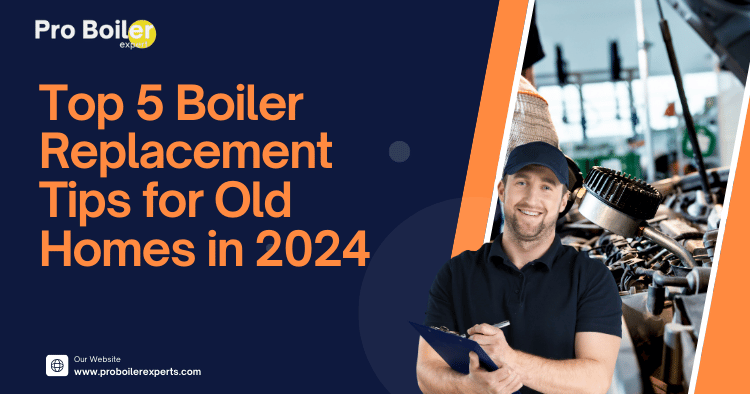- Understanding Your Current Boiler
- Assessing Your Home’s Heating Needs
- Choosing the Right Type of Boiler
- Finding a Qualified Installer
- Maintaining Your New Boiler
Replacing a boiler in an older home can seem daunting, but with the right knowledge, you can make informed decisions that will enhance your home’s comfort and efficiency. In this guide, we’ll walk you through five essential tips to ensure a successful boiler replacement in 2024.
Understanding Your Current Boiler
Before you dive into the replacement process, it’s crucial to understand your existing boiler’s specifications. This includes its age, type, energy efficiency rating, and current condition. Most older boilers are less efficient than modern models, meaning they can significantly increase your energy bills.
Key Points to Consider:
- Age: If your boiler is over 15 years old, it’s likely time for a replacement.
- Type: Identify whether your boiler is a conventional, combi, or system boiler. Each type has its pros and cons.
- Efficiency: Check the annual fuel utilization efficiency (AFUE) rating. A rating of 90% or higher is ideal for modern boilers.
For more detailed information about the benefits of different boiler types, visit Top 5 Benefits of Choosing Combi Boilers for Your Home or Top 5 Benefits of Choosing a System Boiler for Your Home.
Assessing Your Home’s Heating Needs
Every home is unique, and so are its heating requirements. Assessing these needs accurately will help you choose the right boiler capacity and type.
Steps to Assess Heating Needs:
1. Calculate Heat Loss: Perform a heat loss calculation to determine how much heat your home loses. This will help you choose a boiler with the right output.
2. Consider Insulation: Check the insulation levels in your home. Well-insulated homes retain heat better and may require a smaller boiler.
3. Evaluate Hot Water Demand: If you need hot water for multiple bathrooms or appliances, consider a system that can handle that demand efficiently.
Using an online heat loss calculator can simplify this process. Consider tools like the one available from Energy Star.
Choosing the Right Type of Boiler
Once you’ve assessed your needs, it’s time to choose the right boiler. The main types to consider are:
Boiler Type Pros Cons Combi Boiler Space-saving; provides hot water on demand May struggle with simultaneous demands System Boiler Great for larger homes; provides hot water quickly Requires a hot water cylinder Conventional Boiler Ideal for homes with existing systems Takes up more space; requires a tank
Selecting the right boiler type is crucial, as it impacts installation costs, space usage, and energy efficiency. For a comprehensive guide on boiler types, check out Top 5 Benefits of Conventional Boilers for Your Home or Top 5 Benefits of Condensing Boilers You Should Know.
Finding a Qualified Installer
Choosing the right installer can make all the difference in your boiler replacement experience. An experienced professional will ensure that the installation meets safety standards and operates efficiently.
Tips for Finding a Qualified Installer:
- Check Credentials: Look for installers who are Gas Safe registered or have other relevant certifications.
- Read Reviews: Online reviews and testimonials can provide insight into the installer’s reliability and quality of work.
- Get Multiple Quotes: Don’t settle for the first quote you receive. Comparing multiple options can help you find the best deal.
For more information on finding qualified tradespeople, visit Top 5 Tips for Choosing the Right Boiler Installer.
Maintaining Your New Boiler
Once your new boiler is installed, regular maintenance is key to ensuring its longevity and efficiency.
Maintenance Tips:
- Schedule Annual Servicing: Have your boiler serviced by a qualified technician at least once a year to catch potential issues early.
- Bleed Radiators: Regularly bleed your radiators to ensure they are heating efficiently.
- Monitor Pressure and Temperature: Keep an eye on the boiler’s pressure and temperature gauges. If anything seems off, consult a professional.
Staying proactive about maintenance can save you money in the long run and keep your home warm and comfortable. For more tips on boiler maintenance, check out Essential Boiler Maintenance Tips to Keep Your System Efficient.
By following these five tips, you can ensure a smooth boiler replacement process in your older home. Remember, investing in a modern, efficient boiler can lead to significant savings on your energy bills and improve the overall comfort of your home. Happy heating!





